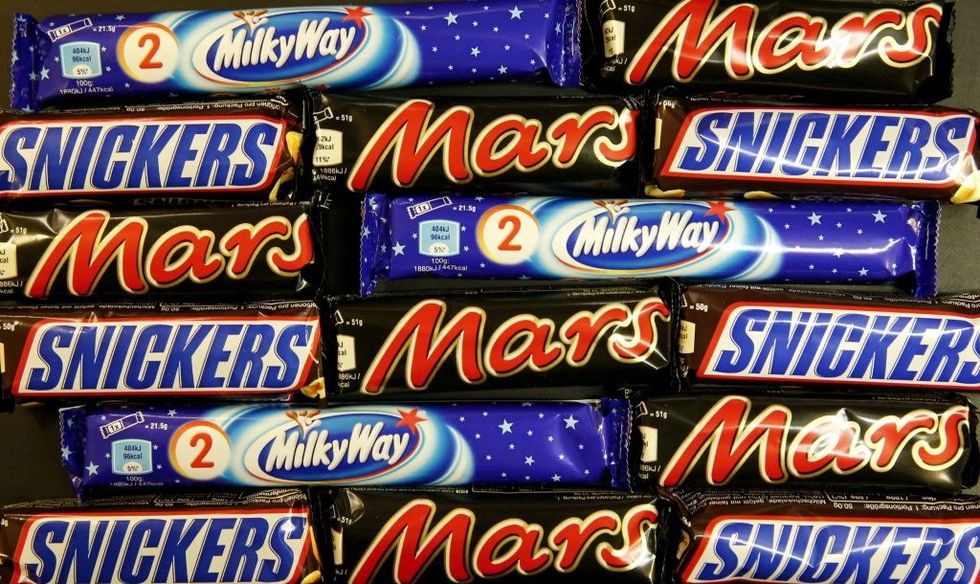By Abigail Summerville | Reuters
A running joke among residents of McLean, Virginia is that the most secretive organisation headquartered in their Washington DC suburb is not the Central Intelligence Agency, but rather a confectionery and pet products company.
Here, the second-richest US family runs Mars Inc, maker of M&M's candies and Pedigree pet food, out of a nondescript building with no corporate logo or any other identifying signage. The CIA's offices, on the other hand, even have a parkway exit sign.
Forbes pegs the net worth of the Mars family members at $117 billion (£90.86bn), exceeded in the US only by the Walton family's wealth, estimated at $267 billion. The Waltons own the ubiquitous Walmart chain of stores.
The vast majority of the Mars family fortune is derived from the eponymous company, one of the few conglomerates to have snubbed a stock market listing in favor of secrecy. The company says this allows it to make decisions for the long term without worrying about investors scrutinising its earnings every quarter.
Being privately held also means that, should a major acquisition sour, Mars is not under stock market pressure to take a writedown, giving it more appetite for risk, interviews with more than a dozen people familiar with its strategy show.
The interviews with these people, who requested anonymity because of confidentiality restrictions they are under, shed light on how Mars, flush with cash and dominant in the food categories it is active in, decided to place its biggest ever bet on expansion -- the $36 billion acquisition of snack and cereal maker Kellanova announced on Wednesday.
Spokespeople for Mars and Kellanova declined to comment on the details of their negotiations.
The deal is the culmination of a flurry of Mars' dealmaking over the last three decades, totaling at least 185 transactions collectively worth $81 billion, according to disclosures that market research firm Dealogic has verified and compiled.
Prolific dealmaking
Spearheading this expansion through acquisitions over the last three decades has been Valerie Mars, the 65-year-old great-granddaughter of Franklin Clarence Mars, who started the company as a candy factory in 1911, according to people familiar with the matter.
As most Mars family members retired from the company and installed trusted lieutenants at the helm, Valerie remained and helped spearhead most of the company's major deals, including the $23 billion purchase of chewing gum maker Wm. Wrigley Jr. Company in 2008, a deal with financial backing from Warren Buffett's Berkshire Hathaway.
As a result, the company's annual net sales grew from a little over $10 billion when Valerie Mars joined it in 1996 to more than $50 billion this year.
As she prepared to stand down as senior vice president of corporate development later this year, Valerie Mars helped the company's CEO Poul Weihrauch, who led the negotiations on the deal with Kellanova CEO Steve Cahillane, the sources said.

The company behind Snickers and Twix already had big market share in the chocolate, gum, and pet nutrition categories, and was looking to invest in new lines of business, such as salty snacks and cereal internationally, where Kellanova, producer of Pringles, Cheez-It and Kellogg’s corn flakes, is strong, the companies said.
While some of Mars' rivals also considered a deal for Kellanova, they could not get comfortable with the purchase price being asked or the lengthy regulatory review that is anticipated, the sources said. While Mars and Kellanova hope antitrust regulators will clear the deal because of their limited product overlap in the first half of 2025, they have given themselves up to two years to complete it in case of protracted scrutiny, according to a Securities and Exchange Commission filing.
High hopes for spin-off
The negotiations between the two companies started in the last few months, after Kellanova completed its spin from WK Kellogg, which was left with the parent company's cereal business in North America, the sources said.
Kellanova's Cahillane and board of directors had high hopes for the new company's stock, and Mars did not believe it could meet their price expectations, the sources added.
But Kellanova's shares struggled after the spin-off in October, trading below their debut price for much of the time since, as investors worried about price inflation and the impact of weight-loss drugs weighing on consumer demand.
It was not until the Chicago-based company raised its annual organic sales and profit forecasts earlier this month and Reuters subsequently reported that Mars was looking to acquire Kellanova that the shares' value grew by about a third.

The purchase price that Mars ended up offering, equivalent to 16.4 times Kellanova's adjusted 12-month cash flow, was in line with other recent deals in the sector, and enough to convince the top company's shareholders, the W.K. Kellogg Foundation Trust and the Gunds - another wealthy family - to back the deal, the sources said.
Most of Mars' rivals did not have the deep pockets to pull off a transaction of this size. Mars had $6.6 billion in cash on hand as of the end of December as well as access to $4 billion in credit lines, according to credit ratings agency S&P Global. It also convinced banks to lend it as much as $29 billion for the deal, according to an SEC filing.
Mars' annual dividends are only about $600 million, well below as a percentage of its cash flow than most of its consumer packaged goods peers pay out, according to S&P, reflecting the family's desire to reinvest in the business.






